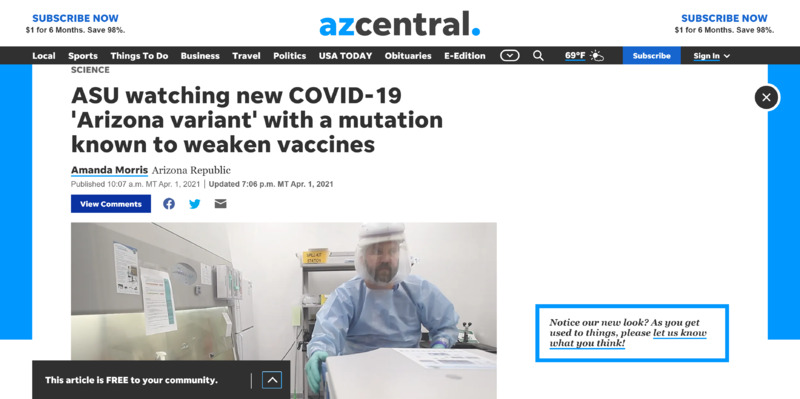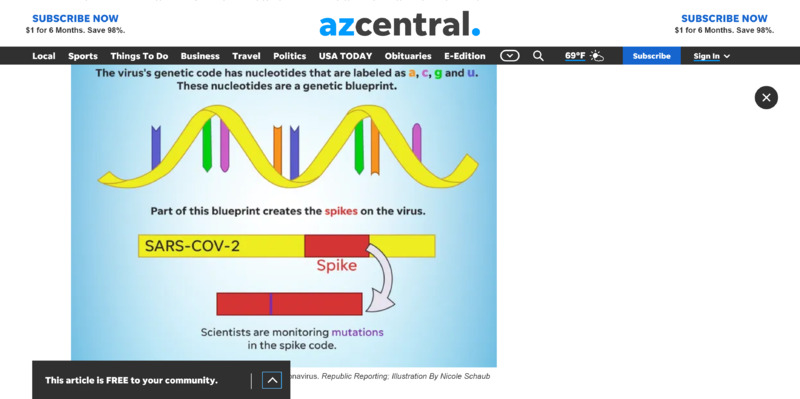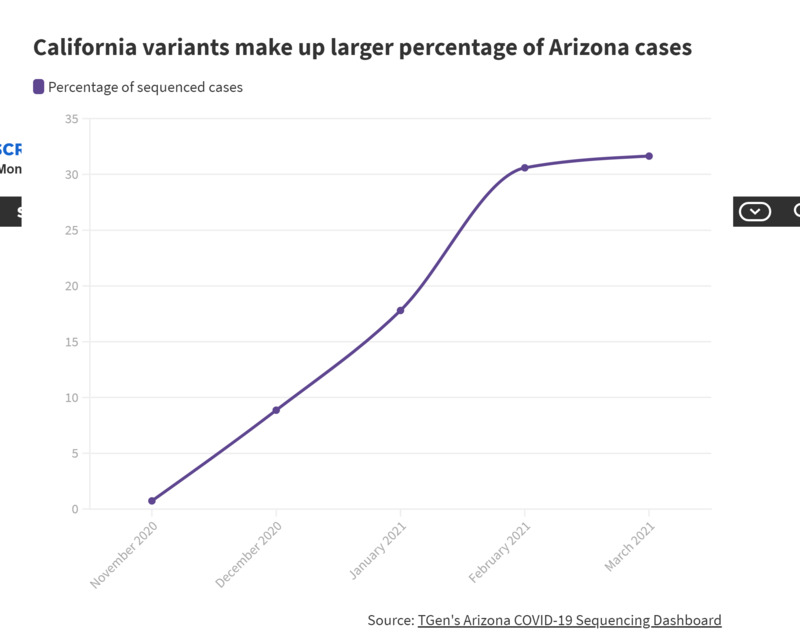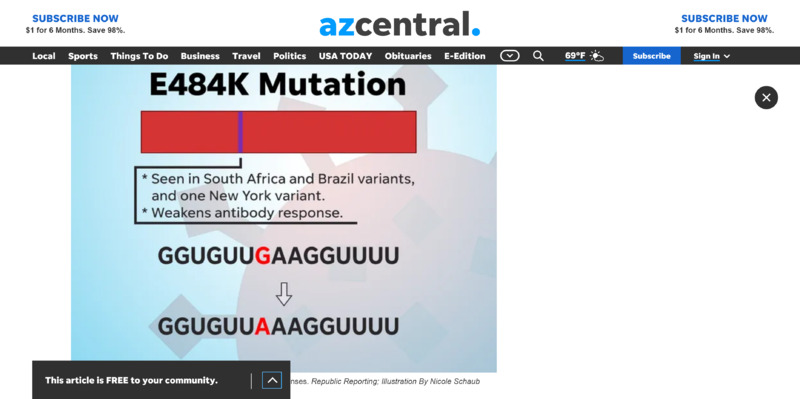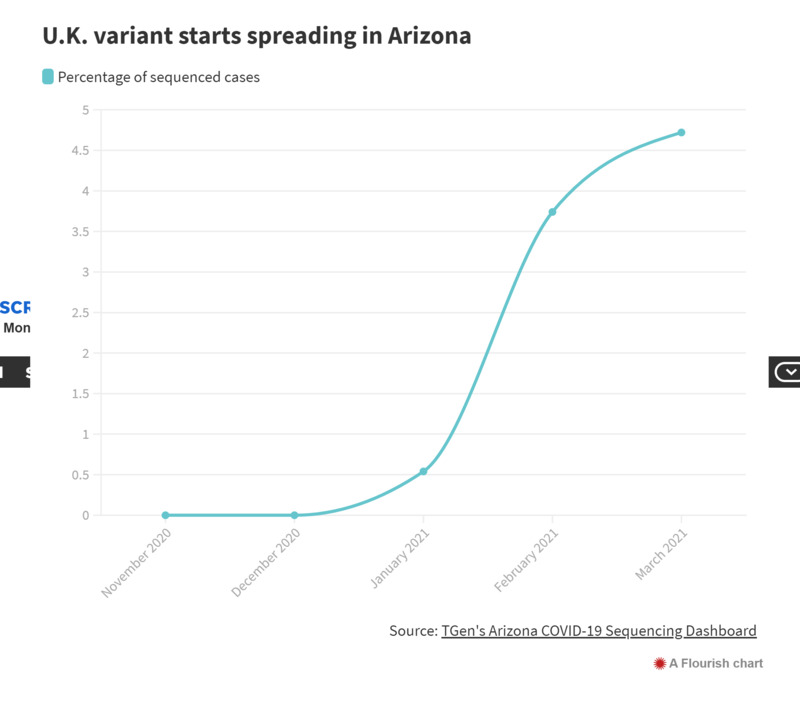Item
News Article: ASU watching new COVID-19 'Arizona variant' with a mutation known to weaken vaccines
Title (Dublin Core)
News Article: ASU watching new COVID-19 'Arizona variant' with a mutation known to weaken vaccines
Description (Dublin Core)
By Amanda Morris of the Arizona Republic:
Arizona State University researchers have found a home-grown variant of the coronavirus emerging in Arizona that they say should be monitored closely because it carries a mutation known for weakening vaccines.
In a non-peer reviewed study that published Sunday, researchers said they have detected 17 cases of the new variant since February, 15 of which were in Arizona. The other two cases were found in Houston in late February and New Mexico in early March, suggesting that the variant has begun to spread.
"My hope is that we do not see more of these cases. The whole point of surveillance is to keep this from spreading," said Dr. Efrem Lim, an ASU virologist and assistant professor.
The variant is known as the B.1.243.1 variant, and descends from a common lineage of the virus called B.1.243, which nationally makes up about 2.5% of all cases, according to David Engelthaler, director of the Translational Genomics Research Institute's infectious disease division in Flagstaff.
"It's not dominant. But, there's a fair amount of that lineage that has been able to hang around," Engelthaler said. "It seems to have picked up this E484K mutation, what we call the 'eek!'"
This E484K mutation has also been seen in the variants first detected in South Africa and Brazil, as well as one new variant recently discovered in New York.
Numerous studies have shown that this mutation — located in the spike of the virus — lowers antibody responses to the virus and could weaken vaccines. Antibodies are one of the body's tool to recognize and fight the virus.
The E484K mutation has been shown to weaken antibody responses.
One study from Seattle showed that it caused the neutralizing effects of antibodies to decrease by tenfold, and numerous other studies have shown similar results.
American vaccine development company Novavax reported that its COVID-19 vaccine was 96.4% effective against the original coronavirus strain and 86.3% effective against the U.K. variant, but was far less effective in South Africa, where the South Africa variant carrying this mutation is dominant.
In the South Africa trials, the vaccine was shown to be 48.6% effective overall, and 55.4% effective in HIV-negative individuals.
Moderna announced a sixfold reduction in antibody responses from its vaccine against the South Africa variant, and Pfizer observed a drop in vaccine-induced antibody responses against the South Africa variant. The Johnson & Johnson vaccine is reported to be 64% effective against moderate to severe COVID-19 in trials in South Africa vs. 72% effective in U.S. trials.
Though the E484K mutation appears to reduce antibody response and possibly reduce vaccine efficacy, Lim stressed that vaccines still work well and said people should get their vaccines as planned.
Scientists are monitoring mutations in the spike of the novel coronavirus.
Community spread is a concern
Though the new Arizona variant carries this mutation, it's still possible for the variant to fizzle out and stop spreading. Lim said researchers have found two other cases where viruses within the B.1.243 lineage independently picked up the E484K mutation, but did not spread.
"In both cases, they never led to more transmissions," Lim said.
Engelthaler has also tracked other lineages where the E484K mutation showed up, but those strains fizzled out. Overall, researchers have detected over 60 samples containing the E484K mutation statewide, according to TGen's Arizona COVID-19 sequencing dashboard.
In order to continue spread, Engelthaler said variants need to be very "fit."
"This mutation has popped up on multiple instances and then just goes away," he said. "This one mutation by itself doesn't give the virus superpowers."
"It’s definitely a mutation of concern but time will tell if it will be a variant of concern," he added.
If the mutation shows up in a more fit version of the virus, then Engelthaler said it becomes more of a concern.
The new variant in Arizona is different than past cases because it has already spread from one person to another and could spread further, according to Lim. He said "one-off" mutations here and there are normal, but that the bigger question is about the transmission levels of this variant.
A variant's ability to spread to others is also dependent on human behavior, Lim said. If people follow public health guidelines, they are less likely to spread variants to others.
In total, Lim said the new Arizona variant has 11 mutations, which is "quite a bit more" than normal virus variations. These 11 mutations could be helping the virus survive or spread and could also act as a "fingerprint" to help researchers identify the new variant, Lim said.
Another one of the 11 mutations is located in the spike that the virus uses to attach to and infect cells. Engelthaler said that because of the importance of the spike, any mutations in that area could affect things like how fast the virus spreads or how severe the related illness is.
Both Lim and Engelthaler said it's too soon to tell whether the other mutations in this variant have any effect.
Overall, this variant still seems to account for a very low percentage of overall cases in the state, according to Dr. Joshua LaBaer, the executive director of ASU's Biodesign Institute. ASU researchers wrote that it's still possible there are more undetected cases of the variant since there are limited efforts to genetically monitor the virus nationwide.
In Arizona, roughly 1.3% of cases overall have been genetically sequenced, or analyzed, according to TGen's Arizona COVID-19 sequencing dashboard. In February and March, over 3% of cases were sequenced, higher than national rates of sequencing, which were below 1% in January.
ASU is working with the Arizona Department of Health Services to monitor the new variant and hopefully prevent further spread through contact tracing and other public health measures, Lim said.
California and UK variant cases rise
Currently the Arizona variant is only considered a "variant of interest" and not a "variant of concern." These are different categories outlined by the CDC and used to assess the risk level of each variant. The CDC defines "variants of interest" as those that are associated with potential changes, whereas "variants of concern" have evidence showing actual changes such as increased transmission, more severe disease or antibody evasion.
There are five variants of concern, which include variants first identified in the United Kingdom, South Africa, Brazil and California. Two variants from California were elevated from variant of interest to variant of concern this month and have rapidly spread in Arizona.
"They're closely related to each other and have definitely been documented with increased transmissibility and some impact on some antibody treatment," Engelthaler said.
In November 2020, both the California variants accounted for only 0.73% of Arizona's genetically sequenced samples. By March, they accounted for 31.64% of samples and are predominant variants statewide.
One non-peer reviewed study from the University of California San Francisco showed weaker antibody responses against the California variants.
Because of concerns that monoclonal antibody treatments may be less effective against these two variants, the U.S. Department of Health and Human Services announced two weeks ago that it would limit the distribution of one treatment to states with high levels of the California variant, including Arizona.
The California Department of Public Health also recommended that the state stop distributing the treatment, which is made by American pharmaceutical company Eli & Lily. In a health alert, the department said this treatment was unlikely to be active against the California variants.
The U.K. variant, which is highly contagious, has also been spreading statewide ever since it was first detected in late January. In March the U.K. variant accounted for 4.72% of genetically analyzed samples.
Currently, Engelthaler said Arizona has over 100 cases of the U.K. variant and over 1,000 cases of the California variants.
Arizona also detected its first cases of the South Africa variant last week.
So far, Lim said that all of the variants of concern are manageable and have not risen to the level of "variant of high consequence," which the CDC defines as variants that are shown to significantly reduce the effectiveness of prevention and medical measures.
"The risk is whether one of these current variants of concern acquire additional mutations that push it up to the next level," Lim said.
To prevent further mutations, LaBaer said it's important to prevent spread of the virus by continuing to follow health guidelines and getting vaccinated. The more the community can prevent the spread of the virus, the less mutations will occur, he said.
"We're kind of in this race right now between the developed dominance of these much more infectious variants that are now spreading throughout the country and getting people vaccinated," LaBaer said. "At the moment, I'm a little worried that the spread of this virus is so fast that that may outpace our ability to get vaccines in arms."
He said it was theoretically possible that new variants could escape the vaccines, meaning that the public would move backward away from reaching herd immunity.
But Lim said the vaccines can easily be updated to protect against new variants. Pharmaceutical companies like Pfizer and Moderna are already working on developing updated booster shots.
In the meantime, researchers will continue to monitor the Arizona variant to see if it spreads further. Engelthaler said he expects the most fit variants of the virus to become more dominant statewide as people continue to get vaccinated and stamp out less successful strains.
"There's a bit of a race here with the virus — a survival of the fittest race," Engelthaler said. "But what we don't want is to raise too much concern that things are going in the wrong direction...what we're doing is closely watching the evolution of a virus like we never have before. It's good that we have this capability, it's more important to put it into context."
Amanda Morris covers all things bioscience, which includes health care, technology, new research and the environment. Send her tips, story ideas, or dog memes at amorris@gannett.com and follow her on Twitter @amandamomorris for the latest bioscience updates.
Independent coverage of bioscience in Arizona is supported by a grant from the Flinn Foundation.
Arizona State University researchers have found a home-grown variant of the coronavirus emerging in Arizona that they say should be monitored closely because it carries a mutation known for weakening vaccines.
In a non-peer reviewed study that published Sunday, researchers said they have detected 17 cases of the new variant since February, 15 of which were in Arizona. The other two cases were found in Houston in late February and New Mexico in early March, suggesting that the variant has begun to spread.
"My hope is that we do not see more of these cases. The whole point of surveillance is to keep this from spreading," said Dr. Efrem Lim, an ASU virologist and assistant professor.
The variant is known as the B.1.243.1 variant, and descends from a common lineage of the virus called B.1.243, which nationally makes up about 2.5% of all cases, according to David Engelthaler, director of the Translational Genomics Research Institute's infectious disease division in Flagstaff.
"It's not dominant. But, there's a fair amount of that lineage that has been able to hang around," Engelthaler said. "It seems to have picked up this E484K mutation, what we call the 'eek!'"
This E484K mutation has also been seen in the variants first detected in South Africa and Brazil, as well as one new variant recently discovered in New York.
Numerous studies have shown that this mutation — located in the spike of the virus — lowers antibody responses to the virus and could weaken vaccines. Antibodies are one of the body's tool to recognize and fight the virus.
The E484K mutation has been shown to weaken antibody responses.
One study from Seattle showed that it caused the neutralizing effects of antibodies to decrease by tenfold, and numerous other studies have shown similar results.
American vaccine development company Novavax reported that its COVID-19 vaccine was 96.4% effective against the original coronavirus strain and 86.3% effective against the U.K. variant, but was far less effective in South Africa, where the South Africa variant carrying this mutation is dominant.
In the South Africa trials, the vaccine was shown to be 48.6% effective overall, and 55.4% effective in HIV-negative individuals.
Moderna announced a sixfold reduction in antibody responses from its vaccine against the South Africa variant, and Pfizer observed a drop in vaccine-induced antibody responses against the South Africa variant. The Johnson & Johnson vaccine is reported to be 64% effective against moderate to severe COVID-19 in trials in South Africa vs. 72% effective in U.S. trials.
Though the E484K mutation appears to reduce antibody response and possibly reduce vaccine efficacy, Lim stressed that vaccines still work well and said people should get their vaccines as planned.
Scientists are monitoring mutations in the spike of the novel coronavirus.
Community spread is a concern
Though the new Arizona variant carries this mutation, it's still possible for the variant to fizzle out and stop spreading. Lim said researchers have found two other cases where viruses within the B.1.243 lineage independently picked up the E484K mutation, but did not spread.
"In both cases, they never led to more transmissions," Lim said.
Engelthaler has also tracked other lineages where the E484K mutation showed up, but those strains fizzled out. Overall, researchers have detected over 60 samples containing the E484K mutation statewide, according to TGen's Arizona COVID-19 sequencing dashboard.
In order to continue spread, Engelthaler said variants need to be very "fit."
"This mutation has popped up on multiple instances and then just goes away," he said. "This one mutation by itself doesn't give the virus superpowers."
"It’s definitely a mutation of concern but time will tell if it will be a variant of concern," he added.
If the mutation shows up in a more fit version of the virus, then Engelthaler said it becomes more of a concern.
The new variant in Arizona is different than past cases because it has already spread from one person to another and could spread further, according to Lim. He said "one-off" mutations here and there are normal, but that the bigger question is about the transmission levels of this variant.
A variant's ability to spread to others is also dependent on human behavior, Lim said. If people follow public health guidelines, they are less likely to spread variants to others.
In total, Lim said the new Arizona variant has 11 mutations, which is "quite a bit more" than normal virus variations. These 11 mutations could be helping the virus survive or spread and could also act as a "fingerprint" to help researchers identify the new variant, Lim said.
Another one of the 11 mutations is located in the spike that the virus uses to attach to and infect cells. Engelthaler said that because of the importance of the spike, any mutations in that area could affect things like how fast the virus spreads or how severe the related illness is.
Both Lim and Engelthaler said it's too soon to tell whether the other mutations in this variant have any effect.
Overall, this variant still seems to account for a very low percentage of overall cases in the state, according to Dr. Joshua LaBaer, the executive director of ASU's Biodesign Institute. ASU researchers wrote that it's still possible there are more undetected cases of the variant since there are limited efforts to genetically monitor the virus nationwide.
In Arizona, roughly 1.3% of cases overall have been genetically sequenced, or analyzed, according to TGen's Arizona COVID-19 sequencing dashboard. In February and March, over 3% of cases were sequenced, higher than national rates of sequencing, which were below 1% in January.
ASU is working with the Arizona Department of Health Services to monitor the new variant and hopefully prevent further spread through contact tracing and other public health measures, Lim said.
California and UK variant cases rise
Currently the Arizona variant is only considered a "variant of interest" and not a "variant of concern." These are different categories outlined by the CDC and used to assess the risk level of each variant. The CDC defines "variants of interest" as those that are associated with potential changes, whereas "variants of concern" have evidence showing actual changes such as increased transmission, more severe disease or antibody evasion.
There are five variants of concern, which include variants first identified in the United Kingdom, South Africa, Brazil and California. Two variants from California were elevated from variant of interest to variant of concern this month and have rapidly spread in Arizona.
"They're closely related to each other and have definitely been documented with increased transmissibility and some impact on some antibody treatment," Engelthaler said.
In November 2020, both the California variants accounted for only 0.73% of Arizona's genetically sequenced samples. By March, they accounted for 31.64% of samples and are predominant variants statewide.
One non-peer reviewed study from the University of California San Francisco showed weaker antibody responses against the California variants.
Because of concerns that monoclonal antibody treatments may be less effective against these two variants, the U.S. Department of Health and Human Services announced two weeks ago that it would limit the distribution of one treatment to states with high levels of the California variant, including Arizona.
The California Department of Public Health also recommended that the state stop distributing the treatment, which is made by American pharmaceutical company Eli & Lily. In a health alert, the department said this treatment was unlikely to be active against the California variants.
The U.K. variant, which is highly contagious, has also been spreading statewide ever since it was first detected in late January. In March the U.K. variant accounted for 4.72% of genetically analyzed samples.
Currently, Engelthaler said Arizona has over 100 cases of the U.K. variant and over 1,000 cases of the California variants.
Arizona also detected its first cases of the South Africa variant last week.
So far, Lim said that all of the variants of concern are manageable and have not risen to the level of "variant of high consequence," which the CDC defines as variants that are shown to significantly reduce the effectiveness of prevention and medical measures.
"The risk is whether one of these current variants of concern acquire additional mutations that push it up to the next level," Lim said.
To prevent further mutations, LaBaer said it's important to prevent spread of the virus by continuing to follow health guidelines and getting vaccinated. The more the community can prevent the spread of the virus, the less mutations will occur, he said.
"We're kind of in this race right now between the developed dominance of these much more infectious variants that are now spreading throughout the country and getting people vaccinated," LaBaer said. "At the moment, I'm a little worried that the spread of this virus is so fast that that may outpace our ability to get vaccines in arms."
He said it was theoretically possible that new variants could escape the vaccines, meaning that the public would move backward away from reaching herd immunity.
But Lim said the vaccines can easily be updated to protect against new variants. Pharmaceutical companies like Pfizer and Moderna are already working on developing updated booster shots.
In the meantime, researchers will continue to monitor the Arizona variant to see if it spreads further. Engelthaler said he expects the most fit variants of the virus to become more dominant statewide as people continue to get vaccinated and stamp out less successful strains.
"There's a bit of a race here with the virus — a survival of the fittest race," Engelthaler said. "But what we don't want is to raise too much concern that things are going in the wrong direction...what we're doing is closely watching the evolution of a virus like we never have before. It's good that we have this capability, it's more important to put it into context."
Amanda Morris covers all things bioscience, which includes health care, technology, new research and the environment. Send her tips, story ideas, or dog memes at amorris@gannett.com and follow her on Twitter @amandamomorris for the latest bioscience updates.
Independent coverage of bioscience in Arizona is supported by a grant from the Flinn Foundation.
Date (Dublin Core)
April 1, 2021
Creator (Dublin Core)
Amanda Morris
Contributor (Dublin Core)
James Rayroux
Event Identifier (Dublin Core)
HST580
Partner (Dublin Core)
Arizona State University
Type (Dublin Core)
online news article
Link (Bibliographic Ontology)
https://www.azcentral.com/story/news/local/arizona-science/2021/04/01/arizona-covid-19-variant-detected-arizona-state-university-researchers-could-weaken-vaccines/4810389001/
Controlled Vocabulary (Dublin Core)
English
Education--Universities
English
Government Federal
English
Government State
English
Healthcare
English
Cities & Suburbs
Curator's Tags (Omeka Classic)
Arizona
Arizona State University
vaccine
mutation
variant
shot
New Mexico
Flagstaff
New York
Pfizer
Moderna
Johnson and Johnson
Novavax
Contributor's Tags (a true folksonomy) (Friend of a Friend)
ASU
Arizona State University
genetic sequencing
variant
Arizona
Arizona variant
vaccination
vaccine
California variant
UK variant
South Africa variant
Johnson & Johnson
effective
Pfizer
Moderna
Novavax
science
biochemistry
research
Collection (Dublin Core)
Vaccine Stories
Healthcare
Linked Data (Dublin Core)
Date Submitted (Dublin Core)
04/07/2021
Date Modified (Dublin Core)
04/11/2021
03/22/2022
08/02/2022
09/09/2024
This item was submitted on April 7, 2021 by James Rayroux using the form “Share Your Story” on the site “A Journal of the Plague Year”: https://covid-19archive.org/s/archive
Click here to view the collected data.
